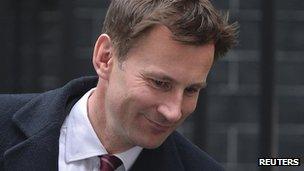No Rupert Murdoch deal, says Alastair Campbell
- Published
Alastair Campbell: "I don't think there was a trade-off between Rupert Murdoch and Tony Blair"
There was no "express deal" between Labour leader Tony Blair and Rupert Murdoch in the run-up to the 1997 election, Alastair Campbell has said.
Mr Blair's former press secretary was asked at the Leveson Inquiry about the backing of Labour in 1997 by Mr Murdoch's Sun newspaper.
Asked if there was evidence of a deal, Mr Campbell said: "Absolutely not."
He said he and Mr Blair sometimes felt "distaste" when dealing with News Corporation chairman Mr Murdoch.
Mr Campbell, making his second appearance at the inquiry, said it would have been "lacking good sense" not to have developed a relationship with Mr Murdoch.
"I never was witness to, and I don't believe there was ever a discussion that said, 'now, Tony, if you do this and do this and do this my papers will back you' - it just never happened," he said.
The government went through issues "on their merits", he added.
Citing issues including rises in the BBC's licence fee, Mr Campbell added: "There are lots of areas where you'd be hard-pressed to say the Murdochs were getting a good deal out of the Labour government."
The Sun's backing of New Labour ahead of the 1997 general election is thought by some commentators to have been key to the party's success.
But Mr Campbell said: "There is the perceived power of newspapers to influence elections but I just don't buy it."
He added: "The Sun backed us because we knew we were going to win, we didn't win because the Sun backed us."
He was also asked about three phonecalls between Mr Blair and Mr Murdoch in the run-up to the Iraq War in March 2003.
Mr Campbell said suggestions that Mr Blair could not have pursued his policy in Iraq without the backing of Mr Murdoch and the Sun were "complete nonsense".
The former Downing Street press secretary acknowledged that the press office fed the Sun stories, but said that it did the same with other papers.
"Every single paper thought we favoured other papers," he said. "You couldn't win really."
Mr Campbell said that the press did give negative coverage to politicians over their stance on the media. "Partly the coverage of Cameron at the moment is a revenge for having set this inquiry up," he said.
'Frankly putrid'
Mr Blair's former press chief has been recalled under module three of the Leveson Inquiry, the relationship between press and politicians.
When he appeared in November during the inquiry's first module into the relationship between press and the public, he said some elements of the media had become "frankly putrid".
But he insisted most journalists were good people with nothing to fear from press reform.
Appearing on Monday morning at the inquiry, ex-cabinet secretary Lord Gus O'Donnell said Andy Coulson should have declared News Corporation shares when he was the press chief to PM David Cameron.
Mr Coulson, an ex-News of the World editor, told the inquiry last week he only considered a possible conflict of interest over the £40,000 shares after he quit his Downing Street role in January 2011.
Asked if Mr Coulson signed a disclosure form when he took up the post in May 2010, Lord O'Donnell said: "A form was signed but it didn't disclose shareholdings and it should have done."

Harriet Harman raised a Commons point of order about Jeremy Hunt's accountability to the House
Meanwhile, shadow culture secretary Harriet Harman made a Commons point of order asking for clarification over whether Culture Secretary Jeremy Hunt was "accountable to this House".
"Will you please confirm whether it is in order for Mr Hunt to say he won't answer questions of MPs because instead he's going to tell Lord Leveson and whether it is in order for him to say he won't place documents in the library because he's giving them to Leveson?" she asked.
A spokeswoman for Mr Hunt has said he will respond to evidence about his links to News Corp, given at the inquiry, when he appears before Lord Justice Leveson himself.
Responding to Ms Harman, the Speaker said that the accountability of a minister to the House was not diluted by external inquiries.
The Department of Culture, Media and Sport (DCMS) said there was "no question" of the culture secretary not fulfilling his obligations to parliament, pointing out that Mr Hunt had already answered a number of questions and made an oral statement in the House.
However, DCMS made it clear that Mr Hunt will not hand over his evidence to the Leveson inquiry on the BSKyB takeover to parliament before it is published by Lord Justice Leveson.
'Selective amnesia'
A spokesman said: "Jeremy Hunt will submit his evidence to the Leveson Inquiry as planned and this evidence will be made public as part of the Leveson process.
"This is a full public inquiry, established under powers granted by Parliament, which has cross-party support. It is in the public interest that the inquiry is able to continue its investigation."
In other developments, former News International boss Les Hinton has accused MPs on the Commons culture, media and sport committee of "misreading" evidence on phone hacking.
That committee's report on phone hacking accused Mr Hinton of "selective amnesia" and being complicit in a cover-up of the extent of the practice.
In a response to committee chairman John Whittingdale, Mr Hinton said the committee's findings rested "on a highly selective reading of the record, and unsupportable leaps in logic and inference".